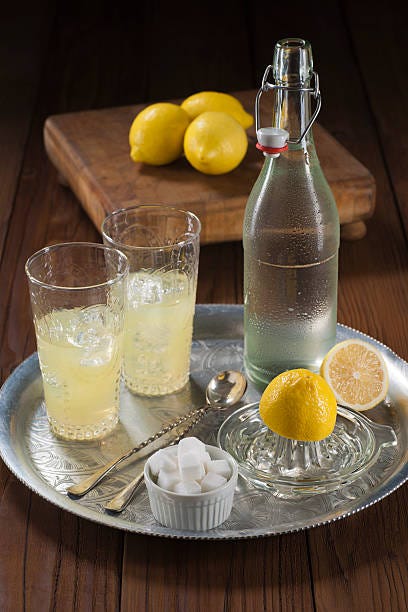Citron Pressé
French Lemonade
It may generally be assumed that as a hedonist of various ingestives (from laudanum to alcohol), Crowley would have available himself constantly of nothing but alcohol. As for many, opening channels to divine thought during or in preparation for ritual is much easier when intoxicated or high and, as smoking or imbibing hard spirits or wine “takes the edge off,” But is not the case.
Several times (at least 16) during Crowley’s 1908 magickal retirement in Paris — as he writes in John St. John — he avails himself of a particularly French speciality known as citron pressé, which translates as “lemon press.” For Aleister, these were always consumed at the famous French dining establishment, Le Dôme Café. Located in at 108 boulevard de Montparnarsse, Le Dôme was an iconic bastion of creativity; for all the authors and painters and poets. Part of the public renovation of Paris by George-Eugène Haussmann, Le Dôme boasts dark, wood interiors and brass railings. The interior made more elegant by low-hanging, dim lights giving it an aura of mystic. But the café also has what every ubiquitous Parisian café requires: expansive outdoor seating which enables customers to partake in a simple cafe at lait, glass of wine, or citron pressé, which was a favorite of Crowley‘s.
In truth, citron pressé is nothing more than lemonade. Yet in the hands of Parisians, is elevated both in excellence and in ritual, as it is served deconstructed; waiting for then costumer to combine all its ingredients of freshly-squeezed lemon juice, sugar, ice water, and a pre-iced glass. It is not a beverage to be rushed; either in its drinking or in its service or preparation. Most restaurants would not make the customer squeeze their own lemon juice — as is pictured — but would provide a small pitcher of freshly-squeezed juice. As to the sugar, obviously simple syrup would make the ingredients coalesce together more quickly. But history has yet to tell me if the restaurant served granulated sugar or as a syrup. On some ways, I would like to think that cubes or granulated were the norm, for then it would require the drinker to take more time in the beverage’s consumption; stirring all the while to dissolve the sugar and cool the concoction.
The benefits of serving a lemonade in this fashion are obvious. It allows the drinker to determine their own level of sweetness versus sour, a single glass can be made and adjusted to a customer’s preference, and during the hot and steamy months of a Parisian summer, it is delightfully refreshing and cool. That Crowley’s 1908 working took place in October could lead one to assert that this was a beverage not for refreshment, but for reflection. Eleven days into this magickal working, he writes of his evening:
9.10. 1/2 doz. Marennes (oysters), Rable de Lievre (saddle of hare), citron press [sic].
I am now able to concentrate OFF the Path for a little.
Whether this means that I am simply slipping back into the world, or that I am more balanced on, and master of, the Path, I cannot say.10.4. Have walked home, drunk a citron press‚ at the Dôme, and prepare for the night.
So here, within the span of ninety minutes, he has two citron pressé; one with a dinner of oysters and hare at Café de Versailles, and again near his apartment just steps from Le Dôme. No alcohol. Just refreshing, palate-cleansing lemonade, assembled by his hands and his hands alone.



I think you have a skipped word in the first line --
"It may generally ^_be_^ aasumed..."